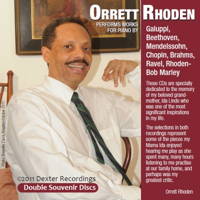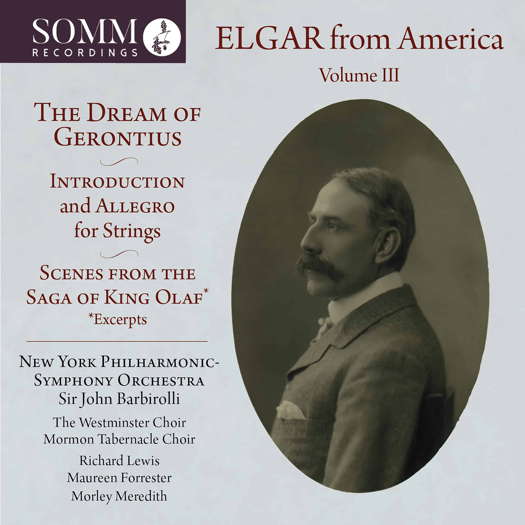 SPONSORED: CD Spotlight. Most Remarkable - Jamaican pianist Orrett Rhoden, heard by Bill Newman.
SPONSORED: CD Spotlight. Most Remarkable - Jamaican pianist Orrett Rhoden, heard by Bill Newman.
All sponsored features >>

Incomparable Musical Beauty
GERALD FENECH listens to Elgar's 'The Dream of Gerontius' from Carnegie Hall
'... a precious addition to this acclaimed treasure trove of historic recordings ...'
Edward Elgar (1857-1935) was not the first composer to think about setting Saint John Henry Newman's poem The Dream of Gerontius. Dvořák had considered it fifteen years earlier and had discussions with the author before abandoning the idea. Even Elgar, like Dvořák, had some misgivings about setting Newman's poem to music, and it took the composer several years before he finally decided to take on the task of composition. What pushed Elgar to start writing the music was an invitation from the Birmingham Triennial Music Festival to compose a major choral work for the 1900 event. He started writing the piece in autumn of 1898, and composition proceeded quickly, but by the time the work was completed, after immense help from August Jaeger, the editor of Elgar's publisher Novello, there were only three months to the premiere.
Then bad luck struck. The Birmingham chorus, all amateurs, struggled to master Elgar's complex, demanding and somewhat revolutionary work. Matters were made worse by the sudden death of the chorus master Charles Swinnerton Heap, and his replacement, William Stockley, an elderly musician, found the music beyond him. The conductor of the premiere, Hans Richter, received a copy of the full score only on the eve of the first orchestral rehearsal. Unsurprisingly, the premiere on 3 October 1900 was a near disaster. The choir could not sing adequately, and two of the three soloists were in poor voice. Elgar was deeply upset, but every cloud has a silver lining. Indeed, the critics could see past the imperfect realisation, and the work became established in Britain once it had its first London performance in 1903 at the Roman Catholic Cathedral of Westminster.
In between these years, the oratorio was a great success in Germany, where it came in for high praise, thanks to the advocacy of Julius Buths, the German conductor and chorus master who made a German translation of the text and presented the piece in Dusseldorf twice, in December 1901 and May 1902 respectively. Elgar attended both occasions, and at the end of the second he was called to the stage twenty times. It was this performance that convinced Elgar that he had written a truly satisfying work. Despite facing hostility from some influential British quarters due to its strong Catholic overtones, which unfortunately dragged on up to the 1930s, the work has come to be generally regarded as Elgar's finest choral composition.
Newman's poem, written in 1865, relates the journey of a pious man's soul from his deathbed to his judgement before God and settling in Purgatory with a final benediction and promise of a re-awakening to glory. The music is dramatic throughout, but there is an almost perfect balance between the meditative and animated elements of the narrative. The choral writing is indeed stirring, and the orchestra has plenty of complex passages to deal with. The final 'Amens' chorus brings The Dream of Gerontius to a concluding glorious reality.
Listen — Elgar: Softly and gently (The Dream of Gerontius)
(ARIADNE 5015-2 CD2 track 10, 5:16-6:15) ℗ 2022 SOMM Recordings :
This Volume 3 of Elgar from America from SOMM Recordings is a precious addition to this acclaimed treasure trove of historic recordings, masterminded by the extraordinary restoration talents of Lani Spahr. Obviously, the centrepiece of this issue is a live recording from Carnegie Hall, New York, of Elgar's inspiring choral masterpiece taped live on 25 January 1959. But the set also includes the Introduction and Allegro for Strings, Op 47, also recorded live on 3 January 1959 and two choruses from King Olaf, recorded in 1953 and 1956 respectively, with J Spencer Cornwall directing the Mormon Tabernacle Choir. These choruses were then making their first appearance on disc.
Listen — Elgar: The Challenge of Thor (King Olaf)
(ARIADNE 5015-2 CD1 track 2, 0:02-0:59) ℗ 2022 SOMM Recordings :
When Barbirolli was at the beginning of his career, Elgar had already recognized his exceptional conducting gifts. Indeed, this is what the composer had to say on the young 'baton wizard': 'He is a rising hope of music in England for whom I have admiration, and in whose work I have confidence.' This trust in the young Barbirolli led to a long and mutually admiring relationship between two men who did so much to define English music. No wonder this performance has a mesmerizing beauty all of its own that must have kept the audience entranced for the whole ninety or so minutes. Indeed, Barbirolli manages to squeeze every ounce of spiritual radiance from a work that grows on you more and more with each listening experience.
Does immortality exist? I will not be answering that question, but if you approach this Dream of Gerontius with devotional ardour, I am sure you will get your answer. A must listen set, complemented by some excellent notes and transfers by Lani Spahr. Hopefully, there are more such treasures to be unearthed, so let us wait and see; in the meantime, immerse yourself in this lake of incomparable musical beauty.
Copyright © 8 April 2022
Gerald Fenech,
Gzira, Malta

CD INFORMATION: ELGAR FROM AMERICA - VOLUME III
ARTICLES ABOUT JOHN BARBIROLLI



